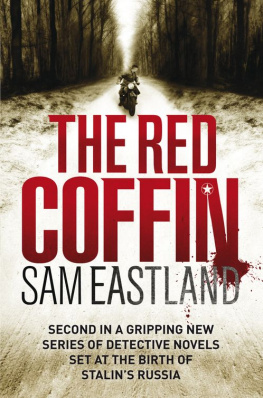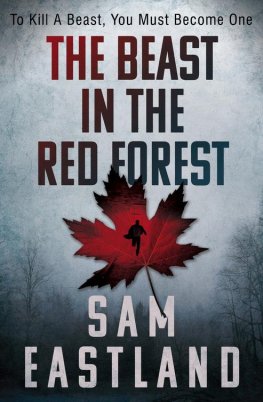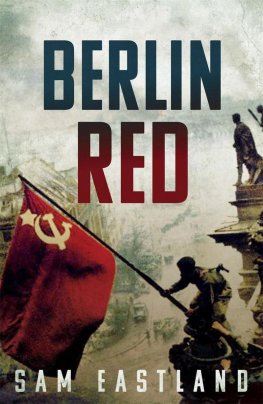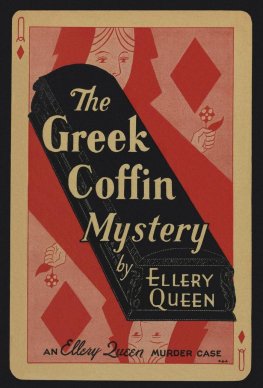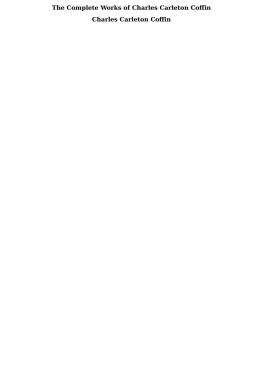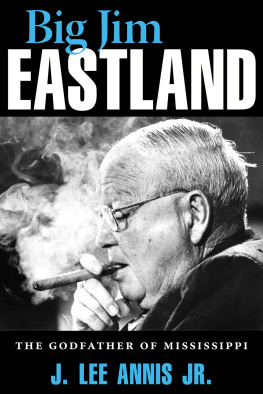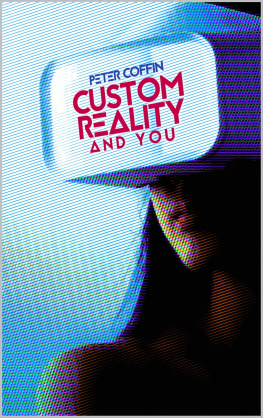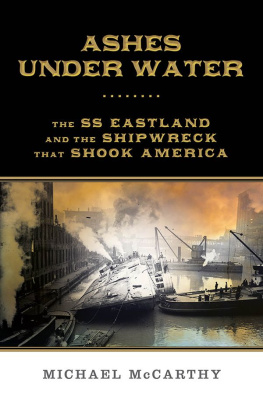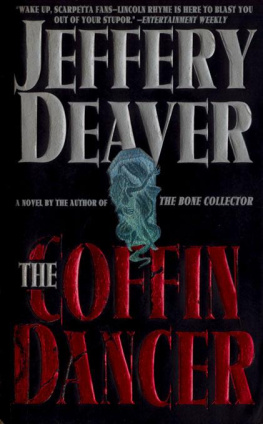Sam Eastland - The Red Coffin
Here you can read online Sam Eastland - The Red Coffin full text of the book (entire story) in english for free. Download pdf and epub, get meaning, cover and reviews about this ebook. year: 2011, publisher: Faber & Faber, genre: Detective and thriller. Description of the work, (preface) as well as reviews are available. Best literature library LitArk.com created for fans of good reading and offers a wide selection of genres:
Romance novel
Science fiction
Adventure
Detective
Science
History
Home and family
Prose
Art
Politics
Computer
Non-fiction
Religion
Business
Children
Humor
Choose a favorite category and find really read worthwhile books. Enjoy immersion in the world of imagination, feel the emotions of the characters or learn something new for yourself, make an fascinating discovery.
- Book:The Red Coffin
- Author:
- Publisher:Faber & Faber
- Genre:
- Year:2011
- Rating:5 / 5
- Favourites:Add to favourites
- Your mark:
- 100
- 1
- 2
- 3
- 4
- 5
The Red Coffin: summary, description and annotation
We offer to read an annotation, description, summary or preface (depends on what the author of the book "The Red Coffin" wrote himself). If you haven't found the necessary information about the book — write in the comments, we will try to find it.
The Red Coffin — read online for free the complete book (whole text) full work
Below is the text of the book, divided by pages. System saving the place of the last page read, allows you to conveniently read the book "The Red Coffin" online for free, without having to search again every time where you left off. Put a bookmark, and you can go to the page where you finished reading at any time.
Font size:
Interval:
Bookmark:
As the motorcycle crested the hill, sunlight winked off the goggles of the rider. Against the chill of early spring, he wore a double-breasted leather coat and a leather flying cap which buckled under his chin.
He had been on the road for three days, stopping only to buy fuel along the way. His saddlebags were filled with tins of food hed brought from home.
At night, he did not stay in any town, but wheeled his motorcycle in amongst the trees. It was a new machine, a Zundapp K500, with a pressed-steel frame and girder forks. Normally he could never have afforded it, but this trip alone would pay for everything, and more besides. He thought about that as he sat there alone in the woods, eating cold soup from a can.
Before camouflaging the motorcycle with fallen branches, he wiped the dust from its sprung leather seat and the large teardrop-shaped fuel tank. He spat on every scratch he found and rubbed them with his sleeve.
The man slept on the ground, wrapped in an oilcloth sheet, without the comfort of a fire or even a cigarette. The smell of smoke might have given away his location, and he could not afford to take the risk.
Sometimes, he was woken by the rumble of Polish Army trucks passing by on the road. None of them stopped. Once he heard a crashing in among the trees. He drew a revolver from his coat and sat up, just as a stag passed a few paces away, barely visible, as if the shadows themselves had come to life. For the rest of the night, the man did not sleep. Tormented by childhood nightmares of human shapes with antlers sprouting from their heads, he wanted only to be gone from this country. Ever since he crossed the German border into Poland, he had been afraid, although no one who saw him would ever have realised it. This was not the first time he had been on such a journey, and the man knew from experience that his fear would not leave him until he was back among his own people again.
On the third day, he crossed into the Soviet Union at a lonely border checkpoint manned by one Polish soldier and one Russian soldier, neither of whom could speak the others language. Both men came out to admire his motorcycle. Zundapp, they crooned softly, as if saying the name of a loved one and the man gritted his teeth while they ran their hands over the chrome.
A few minutes after leaving the checkpoint, he pulled over to the side of the road and raised the goggles to his forehead, revealing two pale moons of skin where the road dust had not settled on his face. Shielding his eyes with one hand, he looked out over the rolling countryside. The fields were ploughed and muddy, seeds of rye and barley still sleeping in the ground. Thin feathers of smoke rose from the chimneys of solitary farm houses, their slate roofs patched with luminous green moss.
The man wondered what the inhabitants of those houses might do if they knew their way of life would soon be ending. Even if they did know, he told himself, they would probably just carry on as they had always done, placing their faith in miracles. That, he thought, is precisely why they deserve to be extinct. The task he had come here to accomplish would bring that moment closer. After today, there would be nothing they could do to stop it. Then he wiped the fingerprints of the border guards off his handlebars and continued on his way.
He was close to the rendezvous point, racing along deserted roads, through patches of mist which clung to the hollows like ink diffusing in water. The words of half-remembered songs escaped his lips. Otherwise he did not speak, as if he were alone upon the earth. Driving out across that empty countryside, that was how he felt himself to be.
At last he came to the place he had been looking for. It was an abandoned farmhouse, roof sagging like the back of an old horse. Turning off the road, he drove the Zundapp through an opening in the stone wall which ringed the farmyard. Overgrown trees ringed the farmhouse, their thick trunks sheathed with ivy. A flock of crows scattered from their branches, their ghostly shapes reflected in the puddles of the farmyard.
When he cut the engine, silence descended upon him. Removing his gauntlets, he scratched at the dried mud which had spattered on his chin. It flaked away like scabs, revealing a weeks growth of stubble beneath.
Shutters hung loose and rotten on the windows of the farmhouse. The door had been kicked in and lay flat on the floor inside the house. Dandelions grew between cracks in the floorboards.
He set the Zundapp on its kick stand, drew his gun and stepped cautiously into the house. Holding the revolver down by his side, he trod across the creaking floorboards. Grey light filtered through the slits between the shutters. In the fireplace, a pair of dragon-headed andirons scowled at him as he walked by.
There you are, said a voice.
The Zundapp rider flinched, but he did not raise the gun. He stood still, scanning the shadows. Then he spotted a man, sitting at a table in the next room, which had once been a kitchen. The stranger smiled, raised one hand and moved it slowly back and forth. Nice motorcycle, he said.
The rider put away his gun and stepped into the kitchen.
Right on time, said the man. Set on the table in front of him was a Tokarev automatic pistol, two small metal cups, each one not bigger than an eggshell. Beside the cups stood an unopened bottle of Georgian Ustashi vodka, a blue-green colour from the steppe grass used to flavour it. The man had placed a second chair on the other side of the table, so that the rider would have a place to sit. How was your trip? asked the man.
Do you have it? said the rider.
Of course. The man reached into his coat and pulled out a bundle of documents which had been rolled up like a newspaper. He let them fall with a slap on to the table, raising a tiny cloud of dust from the dirty wooden surface.
Thats everything? asked the rider.
The man patted the bundle reassuringly. Full operational schematics for the entire Konstantin Project.
The Zundapp rider put one foot on the chair and rolled up his trouser leg. Taped to his calf was a leather envelope. The man removed the tape, swearing quietly as it tore away the hair on his leg. Then he removed a stack of money from the envelope and laid it on the table. Count it, he said.
Obligingly, the man counted the money, walking the tips of his fingers through the bills.
Somewhere above them, in the rafters of the house, starlings trilled and clicked their beaks.
When the man had finished counting, he filled the two small cups with vodka and lifted one of them. On behalf of the White Guild, I would like to thank you. A toast to the Guild and to the downfall of Communism!
The man did not reach for his cup. Are we finished here? he asked.
Yes! The man knocked back his vodka, then reached for the second cup, raised it in salute and drank that too. I think we are finished.
The rider reached across and picked up the documents. As he tucked the bundle into the inside pocket of his coat, he paused to look around the room. He studied the canopies of spider webs, the puckered wallpaper and the cracks which had crazed the ceiling like the growth lines on a skull. You will be home soon, he thought to himself. Then you can forget this ever happened.
Would you care for a smoke? asked the man. He laid a cigarette case on the table and set a brass lighter on top.
The rider stared at him, almost as if he knew this man from someplace before but could not remember where. I should be going, said the rider.
Maybe next time. The man smiled.
The rider turned away and started walking back towards his motorcycle.
He had gone only three paces when the man snatched up his Tokarev pistol, squinted down the line of his outstretched arm and, without getting up from the table, shot the rider in the back of the head. The bullet tore through the riders skull and a piece of his forehead skittered away across the floor. He dropped to the ground like a puppet whose strings had been cut.
Font size:
Interval:
Bookmark:
Similar books «The Red Coffin»
Look at similar books to The Red Coffin. We have selected literature similar in name and meaning in the hope of providing readers with more options to find new, interesting, not yet read works.
Discussion, reviews of the book The Red Coffin and just readers' own opinions. Leave your comments, write what you think about the work, its meaning or the main characters. Specify what exactly you liked and what you didn't like, and why you think so.

